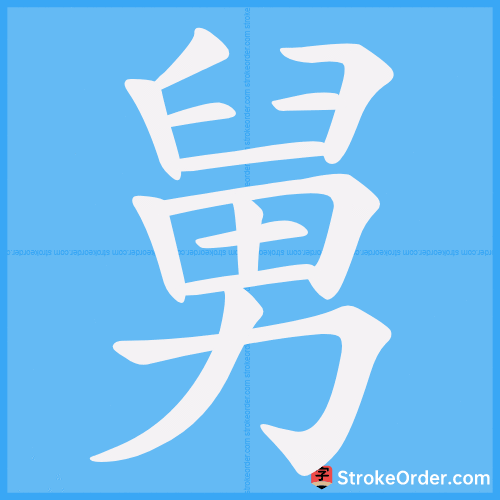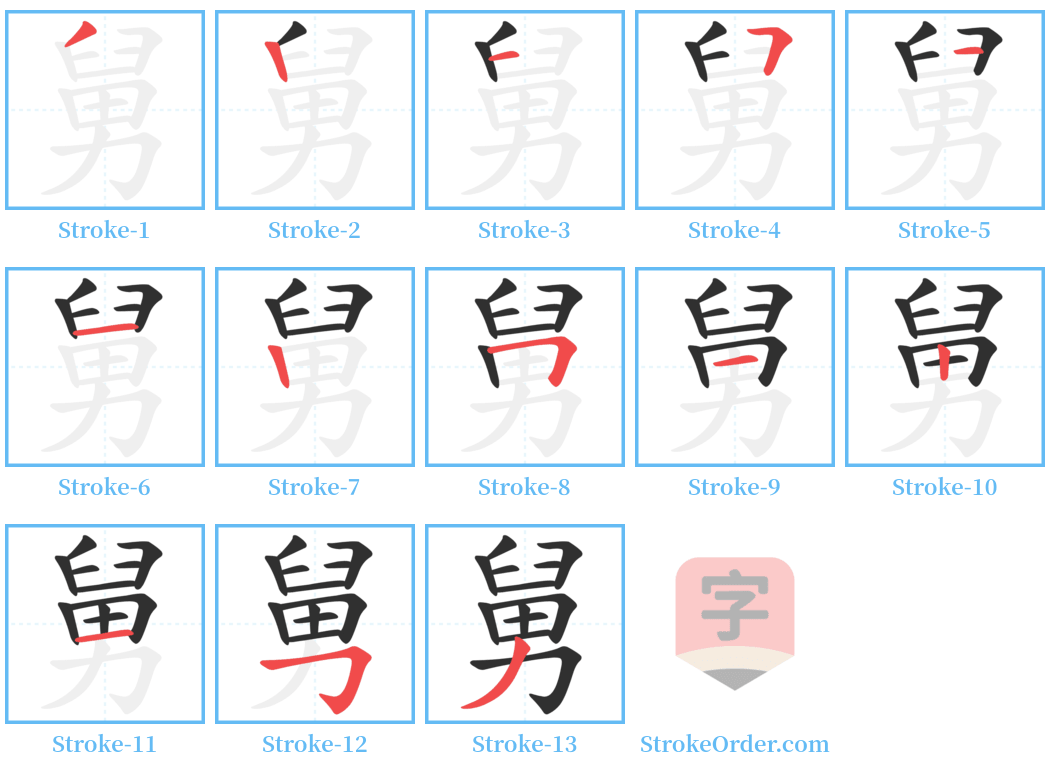舅 Stroke Order
Animated Stroke Order of 舅

Stroke Order Diagrams for 舅

Step-by-Step Handwriting Guide for 舅

Learn to Write Chinese Characters with Video Tutorials
Watch the video of writing the Chinese character "舅", learn the correct stroke order (笔顺) of the character "舅", and master the standard way of writing the character "舅".
Free Printable Handwriting Practice with Stroke Order: 舅
Printable Writing Practice Worksheet of "舅" in Portrait Orientation (Tian Zi Ge)

Printable Writing Practice Worksheet of "舅" in Landscape Orientation (Tian Zi Ge)

Information of 舅
Pinyin
jiù
Radical
臼
Strokes
13 strokes
Usage
★★★★★
Definition
maternal uncle
舅 [jiù]
1. 母亲的弟兄。
(Mother's brother.)
2. 妻的弟兄。
(Wife's brother.)
3. 古代称丈夫的父亲。
(In ancient times, referred to the husband's father.)
4. 古代帝王称异姓大邦诸侯为“伯舅”,异姓小邦诸侯为“叔舅”。诸侯亦称异姓大夫为“舅”。
(In ancient times, emperors referred to noblemen from different surnames as "Uncle Bo" for large states and "Uncle Shu" for smaller states. Nobles also referred to gentlemen from different surnames as "Uncle".)
本义: 舅父,指母之兄或弟
(Canonical meaning: Uncle, referring to the mother’s brother or younger brother.)
造字法: 形声。从男,臼声。
(Character formation: phonetic composition, from "man" and the "jiu" sound.)
引:
1. 《说文》:母之兄、弟。妻之父为外舅,从男,臼声。凡异姓之称,不得称父,则舅之。
("Shuowen": Mother's brother, younger brother. The father of the wife is called "External Uncle"; in terms of pronunciation, since it refers to different surnames, it cannot be referred to as father, so it is called uncle.)
2. 《诗·大雅·崧高》:王之元舅。
("Book of Songs": The king's original uncle.)
3. 宋·王安石《伤仲永》:于舅家见。
(Song Dynasty, Wang Anshi's "Sorrow for Zhongyong": Saw at uncle's home.)
4. 复到舅家。
(Returned to uncle's house.)
例:
又如: 舅氏 (a respectful term for uncle); 舅公 (father's uncle); 舅弟 (uncle's son, younger than oneself); 舅兄 (uncle's son older than oneself).
2. 妻的弟或兄
(Wife's brother.)
例: 如: 妻舅; 小舅子
(For example: wife’s uncle; younger brother-in-law.)
3. 古代称丈夫的父亲
(In ancient times, referred to the husband's father.)
引:
1. 朱骏声《说文通训定声》:舅在则君舅,舅没则曰先舅。
(Zhu Junsheng, "Explanation of Characters": If the uncle is alive, then it is called 'Lord Uncle', if dead, it is called 'Former Uncle'.)
2. 《礼记·檀弓》:吾舅死于虎。
("Li Ji - Dan Gong": My uncle died from a tiger.)
例:
又如: 舅姑 (father-in-law and mother-in-law.)
4. 称妻之父
(Wife's father.)
引:
1. 《礼记·坊记》:婿亲迎,见于舅姑。
("Li Ji - Fang Ji": The son-in-law comes to greet at the in-laws' place.)
5. 古时天子称异姓大邦诸侯为伯舅,异姓小邦诸侯为叔舅。又诸侯称异姓大夫为舅。
(In ancient times, emperors referred to noblemen from different surnames as "Uncle Bo" for large states and "Uncle Shu" for smaller states. Nobles also referred to gentlemen from different surnames as "Uncle".)
引:
1. 《仪礼·觐礼》:小邦则曰叔舅。
("Rituals of Saying: For small states, it is called 'Uncle Shu'.")
2. 《左传·僖公九年》:使孔赐伯舅胙。
("Zuo Zhuan": In the ninth year of Duke Xi, it sent Kong Qi to offer to Uncle Bo.)
Input Method for 舅
Pinyin
jiu4
Wubi
vllb|eler
Cangjie
hxwks
Zhengma
nbky
Four Corner
77427
Unicode
U+8205
Same Pronunciation Characters